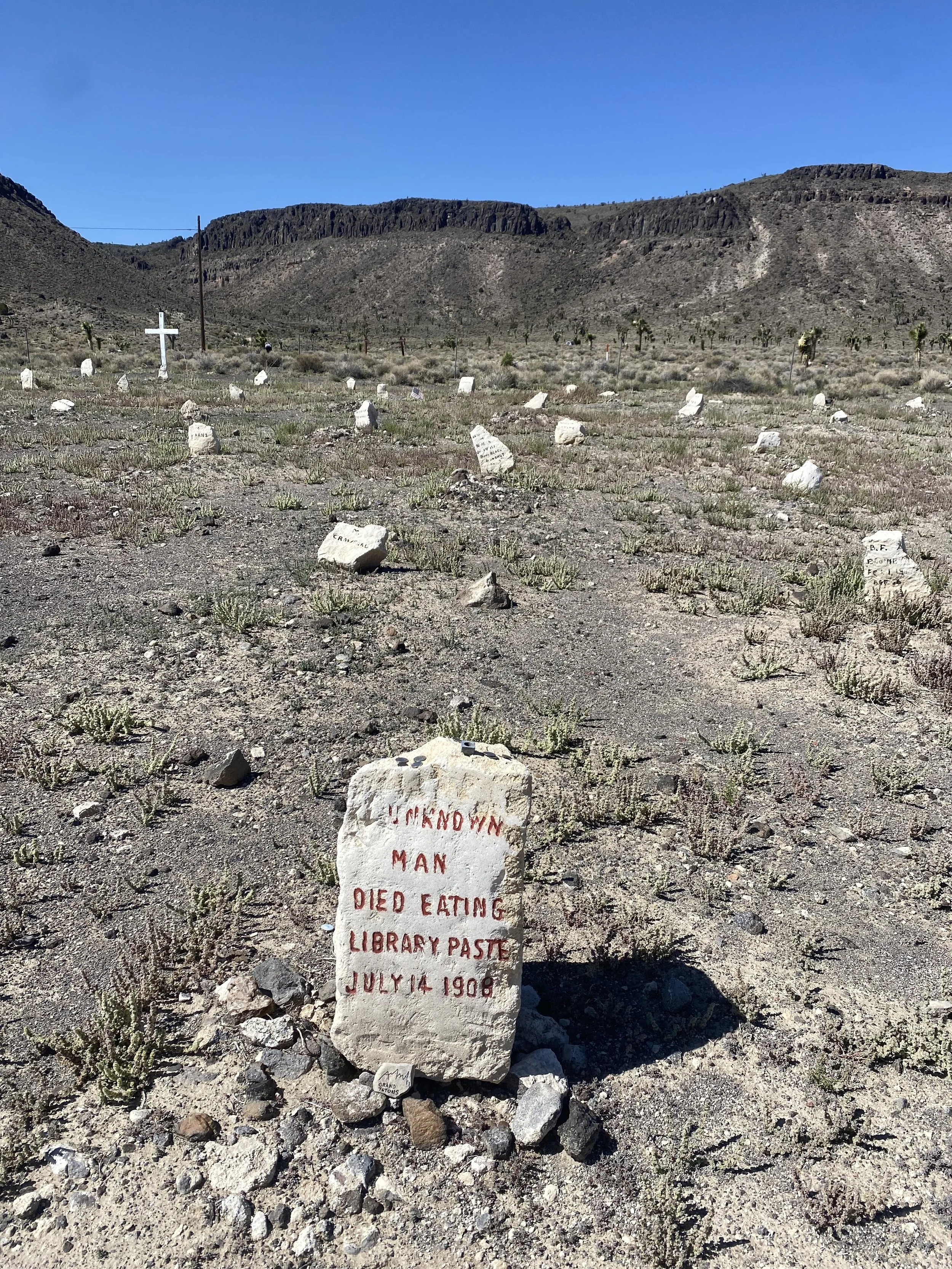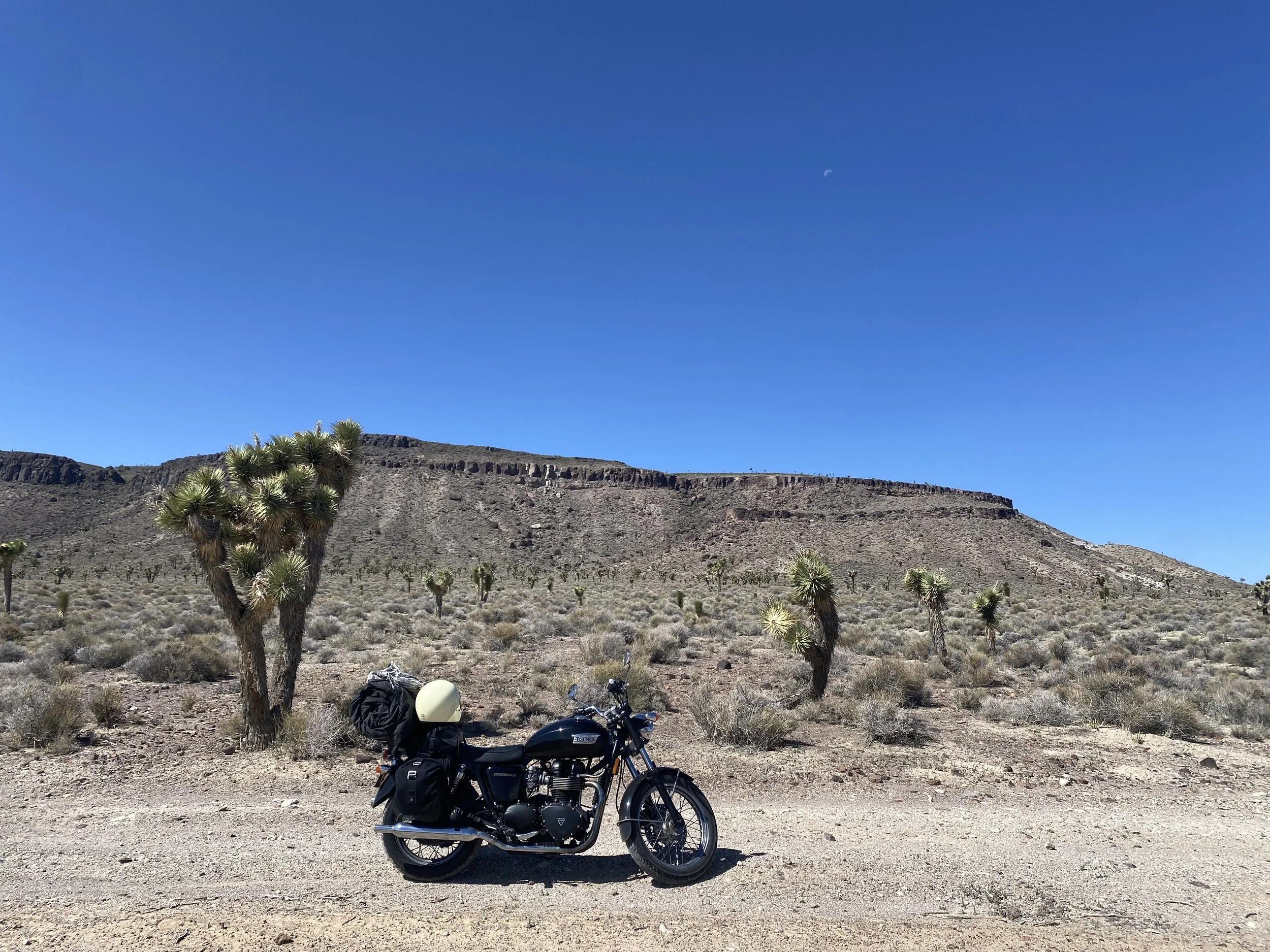Conquering Chekov’s Gun
By Owen Clarke
In one of the original drafts of this piece, I wrote about a motorcycle trip I took some months ago to Reno, Nevada, through the high deserts in the center of the state. I mentioned stopping in a small town, Goldfield, and visiting a historic graveyard where a “Paste Eater” was buried.
His grave is a small, chalk-white tombstone that reads “Unknown Man Died Eating Library Paste July 14, 1908.”
I found the grave fascinating. Not because of his method of death, but because he was the one who did it. Whether he ended his life on purpose or not is a mystery—the grave is all the information that exists about the Paste Eater—but regardless, this guy made a conscious decision to do something that resulted in his demise. He ate library paste.
I used to think about suicide. On a few occasions, it was in a somewhat serious way, probably due to the chronic pain I used to struggle with, and accompanying depression.
But the most common thoughts of suicide, and the ones that continue today—when I am, by all accounts, happy and fulfilled—are not coherent, conscious ideations, but intrusive spurts from my subconscious. I’ll be standing near a high cliff and think, “Shit, what if I threw myself off?”
I’ll be riding a motorcycle or driving a car on the freeway and think, “What if I just turned the handlebars or jerked the wheel right now?”
They are one-second, irrational spurts with no apparent provocation other than proximity—ease of access—to certain death. I have the opportunity to do something that could kill me instantly, so my brain goes, “Shit man, what if?”
They appear, elicit fear, and vanish.
Intrusive thoughts, and even suicidal ones, appear relatively common among the general population. “Call of the void” is one commonly used term, specifically relating to the fleeting urge to hurl yourself off a cliff. If the experiences of those around me are any judge, these fleeting thoughts aren’t necessarily indicative of any true suicidal tendencies.
But for a long time, I didn’t purchase a gun for precisely this reason. I don’t have a particular problem with risk in the activities I undertake, but a gun, it seemed, was the ultimate test of suicidal ideation. With a pistol, killing yourself was as simple as pointing and pulling. Jumping off of a cliff or flipping a car isn’t much harder, but something about guns felt more dangerous, perhaps because the gun is an instrument designed specifically for killing. It comes with an implicit purpose.
It wants to be fired.
So says the narrative trope Chekov’s gun—the principle that every element in a story must be necessary. If a gun is introduced in the course of a narrative, for example, then it must be fired at some point. There is no other reason for the gun’s place in the story.
I used to think about guns in life the way Chekov thought about them in stories. I steered clear. If one appeared, it’d end up being used, right?
Then a few months back, I bought a pistol.
I can’t make much of the reasons behind this decision. I’m not sure why it was time. Perhaps it was the ever-present mass shootings popping up on my social media feeds. Perhaps it was some desire to add an element of masculinity to my life. The point isn’t why I bought a gun though. The point is what happened next.
Owning a gun is alright. I don’t find myself as interested in it as I thought I might be. I’ve fired a few thousand rounds from it, but shooting at paper targets isn’t very fun. The 9mm round leaves a mark in the paper that doesn’t look any different than if you’d poked a hole in the target with your finger. There isn’t a sense that you’ve done anything. It’s clear the gun is designed for more. It’s designed for killing.
Now we come to the realization: Since I bought this gun, I haven’t had a single intrusive thought about doing something to hurt myself.
I suppose I haven’t completely conquered Chekov’s gun, because I may end up using my pistol one day (though I hope I never have to).
But I’m certain that if I ever do use it, it won’t be on myself.
Why? It took me a while to figure out, but I think I’m onto it.
For me, it’s all about proximity. I’ve almost had those suicidal intrusive thoughts when driving a car on a clear road at safe speeds, not when dodging traffic or riding a motorcycle through a hailstorm. I’ve had those thoughts when standing on the top of a cliff, not when roped up climbing the steep ramparts below.
The point is, when I actually need to focus—to keep myself from dying or becoming grievously injured—there is no room for intrusive, illogical thoughts. My brain can’t afford to keep up the charade.
For me, there’s a certain degree of distance from the idea of death that is required in order for involuntary suicidal thoughts to occur. And when you own a gun, there is no distance. It’s right there in your desk drawer. Not just something that could kill you, but something that is designed purely for killing.
With a gun, the paste is right in from of you. It’s prepared with a bowl and spoon and napkin, and it’s the perfect warm temperature, gooey and mouth-watering.
But suddenly, it’s no longer appetizing. The facade crumbles. You see it for what it is. Library paste. Book glue.
And who the hell wants to eat that?
Owen Clarke is a freelance journalist, motorcyclist, and mountaineer, and also the founder of this publication. You can find his work on his website.

